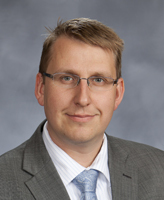
University of Notre Dame Assistant History Professor John Deak jokes that working in the largely neglected field of administrative and constitutional history he’s “the nerdy guy who stands in the corner at cocktail parties.”
But his scholarship has recently earned serious attention in the form of a Richard Plaschka Fellowship from the Austrian Federal Ministry of Science and Research. The fellowship will allow him to spend most of the next year in Vienna, working on his first book, Power and the Politics of State in Imperial Austria, 1848-1918.
“Really, when we think about these things,” he says, “law and administrative norms are how complicated regimes function—and constitutionally there wasn’t a more complicated state in 19th-century Europe than the Austrian Habsburg Monarchy.”
New Perspective
In his research, Deak focuses on how the Austrian imperial bureaucracy adapted itself and the Habsburg state to participatory politics.
“Historians since 1918 have seen this monarchy as a backward empire, which was destined for collapse because it held back its various national groups from their natural development into sovereign states,” he says.
But instead, Deak argues, “we should understand the ways in which the Habsburg state actively developed a vibrant political culture through representative and democratic institutions.
“By understanding the Habsburg Monarchy’s political institutions and political culture, historians, political scientists, and other scholars of Eastern and Central Europe can have a fuller knowledge of the origins and limitations of democracy on the European continent,” he says, adding that was under the aegis of Imperial Austria that Central Europe developed its institutions and definitions of citizenship, the rule of law, and democratic participation.
Welcome Validation
Receiving the Plaschka Fellowship, Deak says, “means that Austrian historians, who ultimately judged the merits of my project, have validated my project and my research. This is immensely satisfying.”
The award is named in honor of Austrian scholar Plaschka, a professor of Eastern European history at the University of Vienna from 1967 to 1993 and a former head of the Austrian East and Southeast Europe Institute who died in 2001.
Deak takes a leave from Notre Dame starting in January 2012 to spend at least nine months living and working in Austria. “It makes research easy,” he says, “since many of the documents of the far-flung empire ended up in Vienna.”
This will be the sixth visit to Austria for Deak, who comes to his academic interests in part because of his personal roots in the area.
Family Ties
“Most of my great-grandparents migrated to the United States around 1900 from various parts of the Habsburg Monarchy,” he says. “They spoke a bevy of languages but identified themselves as ‘Austrians,’ which now has a much smaller and less inclusive definition than it did for them.
“My family gave me a certain curiosity and ambivalence toward questions of national identity. So, even as a child, I was interested in the ‘old country,’ the old Austrian Empire. Much to my delight, it was complicated enough to sustain a lifetime of scholarship, to travel, and to learn new languages—and there were 11 different official languages.”
His continued experiences in Vienna, he says, “make me a better mentor to our graduate students and undergraduates who are just getting started on their own foreign research.”
At Notre Dame this semester, Deak is teaching a lecture course, German History from 1740-1870, as well as an undergraduate seminar called What is History?


